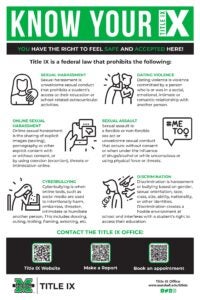Title IX is a federal law that protects students, educators, and school employees from all forms of sex or gender discrimination, including: sexual harassment, sexual misconduct, sexual exploitation, dating and domestic violence, stalking, and retaliation.
Marshall University does not suggest that any case is more or less important than another. However, federal regulations apply only to a specifically defined subset of cases, which is reflected in the procedures outlined below.
The Marshall University Board of Governors (BOG) Policy outlines how the university addresses issues related to sex and gender discrimination.
Only a narrow category of cases fall under the scope of Title IX. Cases that meet the definitions and jurisdictional requirements established by federal regulations will follow the procedures outlined here:
Marshall Title IX Procedures for StudentsMarshall Title IX Procedures for Employees
Cases involving students that do not meet the Title IX criteria will follow the procedures below:
Marshall Non-Title IX Procedures for Students
Amnesty Policy from the Marshall BOG GA-3 Policy
Marshall University prioritizes the physical and mental health, safety, and well-being of individual students and the campus community. To promote a safe environment, the university encourages the reporting of incidents of sexual violence or misconduct.
To reduce barriers to reporting, students who participate in the Title IX process will not be charged with violations of the Student Code of Conduct related to the personal use of alcohol and/or other drugs, provided the report is made in good faith.
Recognized Student Organizations may also qualify for amnesty if a member reports prohibited conduct to the Title IX Office in good faith.
For more information, please refer to:
Marshall Amnesty Policy for Students
Title IX requires institutions to maintain a non-discrimination policy. Marshall University’s policy can be found here:
Marshall Non-Discrimination Policy
